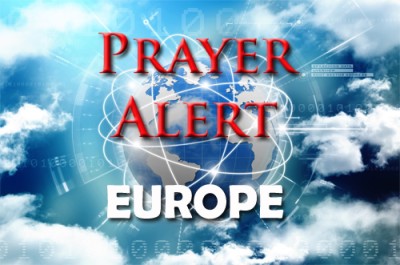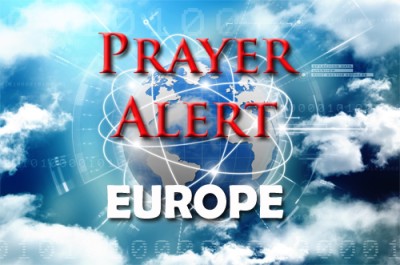Russia: Wagner and FSB
17 Mar 2023Wagner is giving ‘career talks’ in Russian schools to recruit young soldiers. Wagner, Putin’s private army distributed questionnaires entitled ‘Application of a Young Warrior’ to collect pupils' details. Moscow attempted to win the Bakhmut conflict with a ‘human wave’ of battalions of convicts, followed by elite Wagner troops. Half are now dead. This initiative will not replace the convict recruit pipeline. Wagner made slow gains at an immense cost. Pray for the ‘career talks’ to fall on deaf ears as adults to protect vulnerable teenagers. Meanwhile on 16th March a short circuit appeared to have caused a fire, which ignited fuel tanks in a building used by Russia's Federal Security Service (FSB). The FSB is Russia's internal security service, responsible for counterintelligence, border security and counter-terrorism. There has been a spate of arson attacks on government buildings, such as enlistment and conscription offices since the February 2022 invasion of Ukraine.
The international criminal court in The Hague will seek arrest warrants against Russian individuals over war crimes. The arrest warrants come a year after the prosecutor opened investigations into possible war crimes against humanity and genocide. He has made three trips to Ukraine sites of alleged violations. Putin’s spokesperson said, ‘We do not recognise this court; or its jurisdiction.’ Russia left the leading human rights watchdog, Council of Europe, and threatened to withdraw from the World Trade Organization and the World Health Organization, thereby deepening the country’s isolation from the west.
Freddy has weakened then re-intensified breaking all records and has the highest-ever accumulated energy for a single cyclone. This long-lasting cyclone refuses to dissipate, tearing through Malawi and Mozambique. 190 have died in Malawi, many more are injured and 5 are confirmed dead in Mozambique, but the extent of damage and deaths is not yet clear and expected to rise. Mudslides are hampering searches for survivors and many affected areas are cut off. The church is already responding with shelter and food for those whose homes are destroyed and giving psychosocial support to the bereaved as they bury the dead. Malawi's power supply has been crippled with most parts of the country experiencing lengthy blackouts. Cyclones are expected this time of year, but they are becoming much more intense and dangerous due to climate change. Pray for God to wrap his arms around all who are affected by this disaster.
Israel: Religious v secular politics
17 Mar 2023For three years no stable government has been established despite five elections. Currently a right-wing, religious government rules. But the opposition refuses to accept it. There are civil uprisings involving all sectors of society, even the military. Police usually crack down on right-wing and settler demonstrations. Now they are allowing protesters to shut down highways etc. Many say ‘Israel is being shaken to its very foundations’ and it’s getting worse daily. The conflict is a spiritual battle between secular and religious visions. Israel's first Prime Minister David Ben Gurion was never able to reconcile the opposing secular and religious sectors for Israel and finally gave up on the idea of formulating a foundational constitution or charter for Israel. He decided the state of Israel would be founded on the UN's general principles of human rights. Is Israel to be a state like all other nations, or does God have a different calling for Israel?
A research study found church growth requires active small groups, focused evangelism, and the integration of new believers. After the COVID-19 pandemic churches are finding it increasingly difficult to grow their small groups. The authority of scripture is foundational to churches’ discipleship strategies. 9 out of 10 U.S. pastors say scripture is the authority for their church and their lives. Even though pastors hold on to the authority of scripture, it is still increasingly difficult for them to move worship attendees into small groups where they’ll study Scripture. On average only 44% of churches current weekend worship attendees are involved in a small group, Sunday School, or a similar group that provides the relational glue that enables a local congregation to be a place where people love one another.
Global: Migrant crisis
17 Mar 2023Britain. Europe, the US, and other wealthy countries have a refugee problem. In the past week Mexican officials found over 340 migrants from Guatemala, Honduras, El Salvador and Ecuador in an abandoned truck trailer in the state of Veracruz. This included 103 unaccompanied minors. It is one of the biggest recent discoveries of migrant children travelling through Mexico. All appeared unharmed and the trailer had fans and ventilation ports. The driver's whereabouts are unknown. Fleeing Central America’s poverty and violence many migrants end up paying huge sums of cash to people-smugglers to get them across the US border. See A large operation off Italy's coast rescued 1,300 migrants in overcrowded boats near the southern region of Calabria, and two weeks ago73 migrants died in the same region. See UN figures state 103 million people were forcibly displaced around the world in mid-2022. Thirty-seven million were refugees or asylum seekers.
Kenya: I went into debt, trying to get a miracle
17 Mar 2023Evarline is hundreds of pounds in debt, after paying a pastor to pray for her. She lives in a Nairobi slum and can no longer provide for her four children. Evarline lost her job so when she heard about a pastor whose prayers could make life better, she went to see him. He asked her for 15,000 Kenyan shillings (£96). This is called a ‘seed offering’: a financial contribution to a religious leader, with a specific outcome in mind. She borrowed the money from a friend, who took out a loan on her behalf. She had been told this pastor's prayers were so powerful that she would see a return on her money within a week. The miracle never came. The loan her friend took out ballooned due to unpaid interest. She has no idea how she'll pay it back. Her friend has stopped talking to her. She still has no job.
UAE: Detaining 2,400 Afghan asylum seekers
17 Mar 2023Human Rights Watch reported the United Arab Emirates is detaining 2,400+ Afghan asylum seekers at makeshift facilities after being evacuated from Kabul following the 2021 Taliban takeover. They are living in cramped, miserable conditions and stranded in limbo, with no hope of being resettled. The UAE denied conditions were poor and said they were working with the US to finish resettlement processes. Over 10,000 other Afghans who were flown to the UAE have been resettled in America, Canada and elsewhere. A further 70,000 were evacuated directly to the US before American troops left Kabul. The Afghans are housed in two converted apartment complexes known as Emirates Humanitarian City and Tasameem Workers City. Some Afghans had previously worked for US government-affiliated entities or programmes in Afghanistan. They reported constraints on their freedom of movement, limited access to fair refugee status, lack of adequate access to legal counsel or children’s education plus no psychosocial support.







